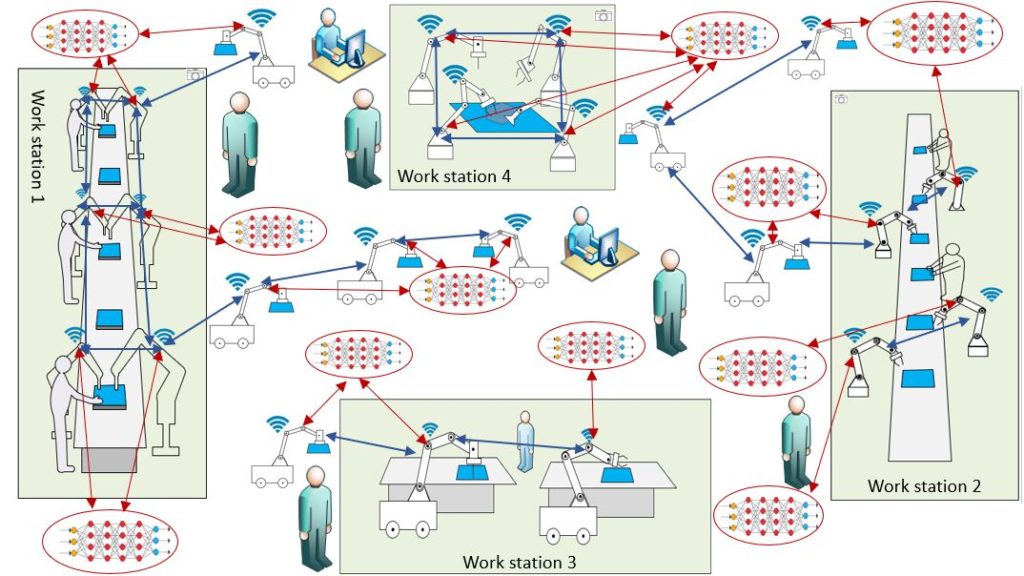Project: Collective Efficient Deep Learning and Networked Control for Multiple Collaborative Robot Systems (DEEPCOBOT)
Period: 2020 – 2025
About the project
The Mechatronics Centre and WISENET Centre at UiA have joined forces in a new multidisciplinary frontier research project that combines Artificial Intelligence and Robotics. They have received NOK 16 million (total budget 20 NOK million) from the Research Council of Norway to develop the next-generation artificial intelligence for industrial collaborative robots. The project is called Collective Efficient Deep Learning and Networked Control for Multiple Collaborative Robot Systems (DEEPCOBOT). The project period for DEEPCOBOT is from 2020 to 2025. The plan is for the project to have three PhD candidates and one postdoctoral fellow.

Project Objectives and Vision
In recent years, collaborative robot systems have received a great deal of attention in the context of a large number of industrial applications, such as additive manufacturing, automotive manufacturing, material handling, packaging and co-packing and quality inspection. The collaboration between multiple collaborative robots (Cobots) and human operators is considered to be the most prominent strategy in Industry 4.0 and future Industry 5.0, sharing the same space and collaborating on tasks according to their complementary capabilities.
DEEPCOBOT project will investigate the design of a new generation of decentralized data-driven deep learning-based controllers for multiple coexisting Cobots, which interact both between themselves and with human operators to collectively learn from each other’s experiences and perform cooperatively different complex tasks in large-scale industrial environments.
The vision of this project is that the learning of the optimal local control policies can be substantially accelerated by sharing both information about previous experiences and computation across multiple neighbor robots connected through a wireless communication network, providing solutions that satisfy the necessary real-time constraints in the considered robotic applications, as well as providing sufficient robustness and interchangeability to the control solutions. This multidisciplinary project covers the areas of deep learning, advanced control, optimization, reinforcement learning, decentralized shared control, embodied artificial intelligence, bi-directional interaction between robots and human operators, and cross-layer networking with significant potential in industrial applications.
Funding
The project is funded by the Norwegian Research Council’s ICT and digital innovation program, IKTPLUSS, within the section of Transformative Research. The Program is called “Ubiquitous Data and Services – Researcher Project”. The Program funds long-term projects that generate new knowledge and technology that promote productivity and efficiency.
The total budget is NOK 20 million.
Partners
The project involves a collaboration between UiA and the partners, Mechatronics Innovation Lab (MIL), Omron Electronics Norway, ABB Norway, the University of California San Diego (USA), KTH Royal Institute of Technology (SWE), and the University of Navarra (SPA).

Collabortations
- Nanyang Technological University, Singapore
- New York University, USA
- Norwegian University of Science and Technology, Norway
- Advanced Remanufacturing and Technology Centre , ASTAR, Singapore
